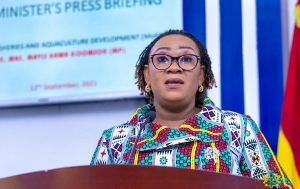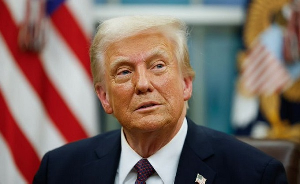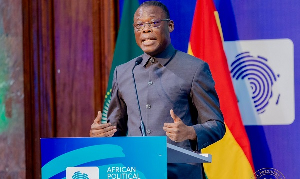Although there is some truth in Yahaya?s criticism of our Northern cousins? behaviour, however the root cause of the continuous conflict in the Northern half of our country since the overthrown of Dr Nkrumah needs to be critically examined.
As the writer and other commentators are very much aware, the massive development that has been going on in the Southern half of our country has largely by pass the North. Those who have a good knowledge of development in terms of the ?core? and ?periphery? within a nation state and the rational behind this notion would bear me witness.
From the time that Dr Nkrumah was tragically overthrown by a bunch of adventurers supported by the CIA, the north has largely been ignored. Despite massive investment pumped into the expansion of free education and primary health care in the region, no tangible opportunity was created to sustain our northern brothers and sisters to remain and help push development from there to meet the one that has already started from the Southern half. To most Ghanaians, cities and towns beyond Brong Ahafo does not merit much attention. Will the real Ghana stand up?
Even in developed countries in the Western Hemisphere development has never been even within countries and among countries. Thus within the European Union there is the golden triangle of London, Paris and Berlin where all the major investment coming into the EU goes before the other regions are looked at??though they also get their fair share of investment income. It is true that we do have some of the brilliant scholars in our country from the north, but I hope this simple analysis would calm down those who unnecessary criticise the civil unrest and violence that has raged the northern half of our country for over 3 decades without looking at the causes. Needless to say, the violence cannot be classified as an isolated case without linking into another essay, this time by Sintim-Misa. Denying a group of people their fair share of the national development or living in a country where one sector is denied its fair share of the national cake would ultimately result in inter civil strife and unrest. In his analysis, Sintim-Misa looks at the divide that has emerged in our country?.. This time not about the rich and the poor but about competence and blame culture. Sintim-Misa?s analysis should be a wake up call for all Ghanaians, and to a degree the leaders and Policy makers not only in Ghana, but the sub-region as well. We tend not to take our own resources and capabilities serious until such time that people from else where come in to tell us precisely how we should be running our affairs. This is not simply a matter of simply colonialism as Sintim-Misa asserts. Others like ourselves who were also colonised did not blame the lacklustre way of doing things on their former colonial masters. First take the case of the countries in the pacific rim?..the so called ?Asian Tigers? or ?Newly Industrial Countries? of East and South East Asia. They exhibit the work ethics that is sadly lacking in Africa. Even Vietnam, having been freed from its long civil war has forged ahead of sub-Saharan Africa. They realised that in order to lift their people from poverty and economic bondage, have to give their all in the interest of the state before self.
Sintim-Misa looked at the tragedy of under-development and politics. The tragedy that Sintim-Misa identified started after the overthrown of Dr Nkrumah?and was partially corrected by ex-President Rawlings after those turbulent years of 1979 to 1985 when the economic reforms took off. Critics can argue about the dates??. but it was not until ex-President Rawlings linked into the economy the skilled Ghanaians who left the motherland through the Structural Policies that the present ?Nation One? that Sintim-Misa identified emerged. Along the line we forgot to extend this rapid development to our Northern cousins?.thus the continuous internal conflicts that Yahaya also identified but failed to look at the causes.
This brings us to the question of the location of our capital city. Would it be prudent to relocate our capital city to the middle of the country? Wouldn?t it be better if Accra-Tema and Kumasi are earmarked as the commercial hub and somewhere between Brong Ahafo/Northern Region carved out to be the capital city to equalised development across the whole country? I know our Western and Central Region cousins would vehemently argue that they would be worse off if this idea gains currency among policy and opinion makers. I know my home regions, the Central and Western Regions? haven?t enjoyed development as it should?but so too is the Volta Region?..in a nutshell, what I have done is to argue to for a total rethink in terms of development across the board. The huge inflows from Ghanaians in Diaspora should be spread across the board and not concentrate this resources in Accra-Kumasi. The Diasporan remittances should and must be included in the 5-year development plan and should be concentrated in the area of social development. Both Sintim-Misa and Yahaya stated that Ghana could have done better than it is doing now?with the calibre of brilliant scholars, entrepreneurs, businessmen and women and workforce. Ghanaians from all regions have excelled in their chosen fields in any where that they happened to be??and there are counties testimonies to this?so why can?t we transfer these skills to our motherland??.the land that the Big 5 fought for us. The Vision 2020 should be our ultimate goal?it might look a difficult task?but so it was for Vietnam, Malaysia and China. Of course we can not compare ourselves with China nor can we with Korea due to the nature of geo-politics?? but our destiny is in our hands?. We have got our own world in our hands. Let Dr Nkrumah?s battle cry be our light ?FORWARD EVER. BACKWARD NEVER?. We should all be in alliance to fight for our motherland. God Bless our nation Ghana.















